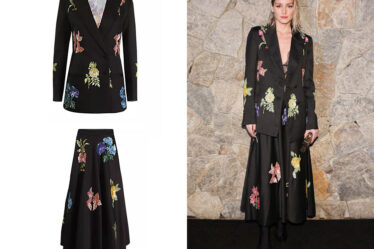
Vestiaire Collective, the Paris-based resale company, is buying Tradesy, a California-based competitor, signalling further consolidation in resale as the market heats up.
The deal included a mix of cash and equity, but terms were not disclosed.
In the acquisition, the two companies will merge their teams and share company tools like technology in the luxury authentication space.
Max Bittner, Vestiaire Collective’s chief executive, and Fanny Moizant, the company’s founder and president will stay on in the roles for both companies, while Tradesy founder Tracy DiNunzio, will become chief executive of the US operations of Tradesy and Vestiaire Collective.
With the two companies under one roof, Vestiaire is now looking to expand its reach in the US market and ramp up its assortment of secondhand luxury goods.
“If you look at the marketplace business, the hunt is to get as much assortment as possible,” said Bittner.
Tradesy and Vestiaire Collective both operate as peer-to-peer marketplaces — as opposed to buying luxury goods from sellers, like The RealReal. On the sites, sellers post their pre-owned Chanel blazers and Louis Vuitton tote bags and pay a percentage of their earnings to the platforms.
Vestiaire was founded in 2009 and began with a focus on the European customer, but now counts the US as its biggest market, Bittner said. The company has raised over $650 million in funding, including a $215 million investment from Kering last year, pushing the company’s valuation above $1 billion. The company, looking to expand its presence in the US, turned to Tradesy, which has been in the resale space since 2009 and developed a following because it offers a lower commission rate than competing platforms.
“With Tradesy, we are looking much towards not only being a European company selling to the US market but being a strong local US business also,” said Bittner. “The US is an extremely big luxury market and this will now move us towards the reflection of the global luxury mix and the role that the US plays. Tradesy … understands the US consumer.”
Vestiaire’s acquisition of Tradesy comes just as the resale market is going through consolidation. The market is expected to grow at an annual 15 percent and could be valued at $65 billion to $100 billion by 2030, according to McKinsey. In June 2021, craft marketplace Etsy bought Gen Z resale platform Depop for $1.6 billion. In September 2021, Goat Group, the parent company of sneaker resale sites Goat and Flight Club, invested in menswear resale platform Grailed, with the two competitors agreeing to share expertise.
Other resale platforms have turned to IPOs to generate the extra cash needed to grow. ThredUp, Poshmark and The RealReal have all gone public (but still struggle with profitability). In January, Bloomberg reported sneaker resale marketplace StockX was working with bankers for an upcoming IPO.
Resale platforms are not just competing with each other. Increasingly, luxury brands like Valentino and Gucci have stepped into resale too.
In merging the two businesses, Bittner said Vestiaire will have a better chance at competing for the shopper, with a more competitive assortment. With its purchase of Tradesy, Vestiaire will now boast 23 million users and a portfolio of five million products, Bittner said (Bittner declined to share annual revenue).
The two companies will still operate on separate websites, but will likely start working together.
“There’s a lot of details to be ironed out but … you can expect over time there will be some sort of cross-listing of product,” he said.
The other benefit in the acquisition is the sharing of technology in the luxury authentication space, which is still a pain point for resale.
“There are significant advantages to be had [in resale] from tech, like pricing, curation and personalisation,” said DiNunzio. “Each of our teams has independently made some trailblazing advances, but combined, we’ll be able to accelerate.”



